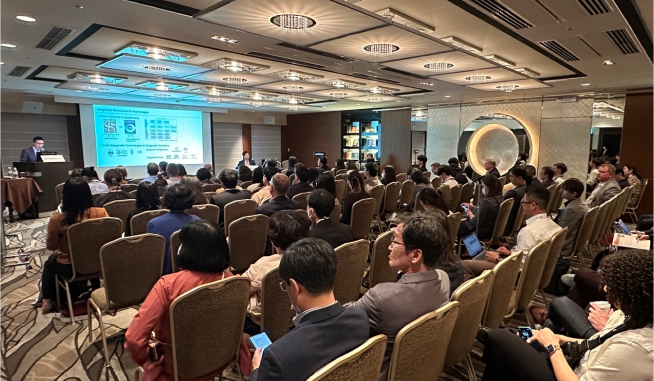During the symposium on May 11 (Thursday), under the theme of skin epigenetics, Amorepacific R&I Center gave a presentation on the results of its research and future directions.

Professor Kang Sewon, Johns Hopkins Medicine Department of Dermatology, presented on Epigenetic Landscape of Skin Aging. Kang introduced the development of epigenetics research on skin aging and shared what he discovered regarding the possibility of pharmacological control of photoaging skin from the perspective of epigenetics.
Dr. Kim Kyuhan from Amorepacific's R&I Center delivered a talk on 4 different cases of skin epigenetics research carried out at Amorepacific, under the topic Advanced Epigenetic Regulation for Skin Anti-Aging. Included were the anti-inflammation effects by adjusting the ceRNA network of ginsenomics (BIOGF1K); the formation of skin barriers by adjusting skin epigenetics of EGR3 and efficacy of peony root extract; the efficacy of RE.D flavonoid (camellia flavonoid) in the adjustment of the epigenetic clock; the skin-brightening and anti-aging effects of miR-125b and melasolv.
Last December, Amorepacific and Johns Hopkins Medicine Department of Dermatology collaborated to launch the New Beauty Research Initiative (NBRI). Through this, they have been able to explore the dermatology landscape on various fronts, including skin epigenetics.
Park Youngho, Director of R&I Center at Amorepacific, said, “It was very meaningful to share the latest discoveries in how epigenetics affects skin aging with world-class scientists. Going forward, Amorepacific will introduce innovative products that incorporate the results of our research in skin epigenetics and do our best to make our customers worldwide healthier and more beautiful.”
ISID was founded in 2013 to promote collaboration among dermatologists around the world. They hold an academic conference every five years with this year's ISID having been held between May 10-13 at Keio Plaza Hotel, Tokyo, Japan.
